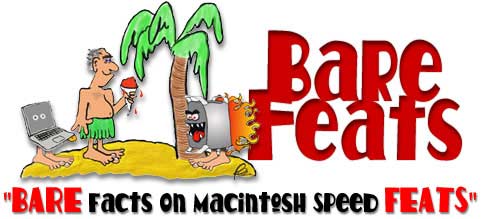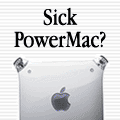

SmallDog.com
has refurbished
towers, laptops, displays, etc., with 12 month
warranty.
|
|
Originally posted 04/21/03 by rob-ART morgan, mad scientist I can tell from the email I'm getting that there's a lot of interest in the Toshiba 60GB 5400rpm "GAX" 2.5 inch 9.5 mm drive with 16MB cache and the Hitachi* 80GB 4200rpm Travelstar 80GN 2.5 inch 9.5 mm drive with 8MB cache. Which is the fastest? Which is quietest? Which makes the best replacement drive for a PowerBook G4? Which performs best in a FireWire case kit? And which FireWire bridge chip works best with these drives, the Initio 1430 or Oxford 911? And is USB 2.0 still slower than FireWire? I tested the two newest drives, two fastest "2002" drives (40G GNX and GAX), and the original drive that came with the PowerBook (40G GAS). 
ANALYSIS Although the Toshiba 60GB "GAX" was fastest 4 out of 6 tests, I think the Hitachi* 80GB "GN" is the best overall choice to upgrade your PowerBook. For one thing, even with the slower spindle speed and smaller cache it was first or second fastest in 5 out of 6 tests. Furthermore, I was struck by how quiet the Hitachi* 80GN drive was. While the Toshiba was whining and clicking, you could barely hear the Hitachi* purr. Both drives have fluid dynamic bearings in their spindle motors but Hitachi* has added further dampening to their voice coil motors and actuator. Finally, the Hitachi* 80G drive holds more than the Toshiba.
FIREWIRE versus IDE (ATA) Do the drives run faster or slower if put in a FireWire case kit? Overall, the drives ran 2% faster when testing in FireWire case kits. The Hitachi 80G GN gained the most from being in a FireWire case with its 6% increase, pushing it past the Toshiba 60G GAX as the fastest FireWire notebook drive. In other words, if you add storage to your PowerBook using an external FireWire drive, you aren't giving up any speed. I tested the two newest drives with both Oxford 911 and Initio 1430 bridge chips. The speed difference was insignificant with the exception of the Toshiba 40G GAX which was "happier" in the Initio case.
FireWire 400 versus USB 2.0 I didn't have a USB CardBus card for the PowerBook but I did test the Toshiba 60G GAX in a Wiebetech MicroGB+ Combo kit connected to an Orange Micro USB 2.0 PCI card which was installed in a PowerMac G4/1.42 MP. The drive ran 44% faster using the FireWire port. USB 2.0 remains slower than FireWire or IDE/ATA in the real world, no matter what they say about theoretical speed. And FireWire 800 is only going to widen the gap.
WHERE TO BUY TransIntl.com has the lowest price on the Hitachi* 80G Travelstar 80GN drive. GoogleGear.com has the lowest price on the Toshiba 60GB "GAX" drive . Wiebetech will sell you a dual port FireWire or FireWire/USB2 Comob case kit with or without the drives mentioned above.
TEST NOTES The internal ATA and FireWire testing was done using an Apple Titanitum G4/800 PowerBook with 1MB of SDRAM. USB 2.0 vs FireWire 400 testing was done using an Orange Micro USB 2.0 PCI card in an Apple 1.42GHz MP Power Mac. FireWire and USB 2.0 case kits were the MicroGB+ from Wiebetech. The drives tested included... Toshiba 60GB 5400rpm MK6022GAX with 16MB cache (* IBM Storage has merged with Hitachi Storage to form Hitachi Global Storage Technologies. Visit HGST.com to see storage products you used to see on the IBM site.) SEE "HOW WE TEST" for details on the 6 tests reflected in the graphs. |
Has Bare Feats helped
you? Say "thanks"...
with a donation.
HOME PAGE
SPEED TEST RESULTS by Category
HOT DEALS on speed upgrades

"BARE facts on Macintosh speed FEATS"
Email webmaster at rob-art@barefeats.com
(Bare Feats is hosted on a G4 Power Mac server by MacDock.com)







